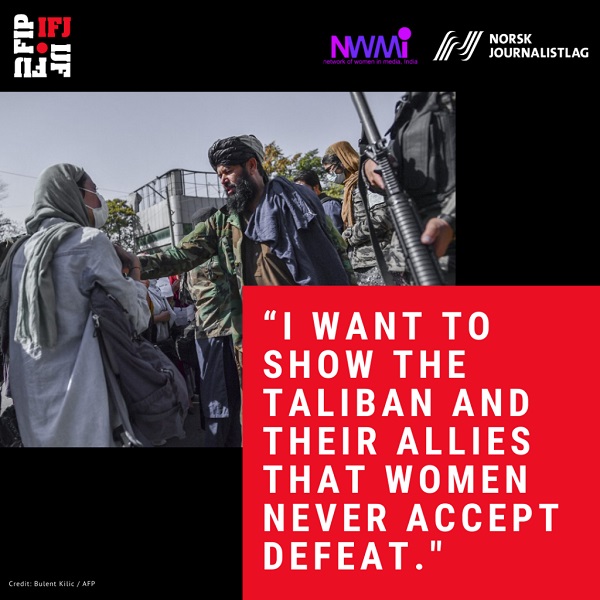“In their Own Words: Afghan Women Journalists Speak”, a report by the International Federation of Journalists and the Network of Women in Media, India, launched on Human Rights Day 10 December 2021, also marks the culmination of the 16 Days of Activism Against Gender Based Violence. The report tells poignant stories of women in the media clutching on to hope in the midst of utter despair at the sudden violation of their rights over the past few months.
After the Taliban rapidly took over the country in August, Afghan women and girls have borne the brunt of their actions against journalists, especially women journalists. With religious diktats determining content on television and prescribing a dress code for women journalists, the media are being muzzled. Hard-won freedoms have vanished as women were pushed out of their jobs, back into the domestic sphere, and reduced to penury.
From the report
“I want to show the Taliban and their allies that women never accept defeat. Women have always been and will always with be us. With the support of committed women from other countries, we will once again strive to achieve the rights of Afghan women,” says Afghan radio journalist Noor Begum (name changed for security reasons).
Noor, like many other women journalists who fled Afghanistan, is attempting to build a new life for herself and her family in North America. But many more remain, facing immense hardships, stripped of their identity as journalists, their livelihoods axed by the Taliban in one fell stroke.
“Since I was the breadwinner of my family of eight, we are now facing economic challenges due to losing my job. Unfortunately, the arrival of the Taliban in Kabul took away our work and life,” says one broadcast journalist who has worked in Maidan Wardak province and Kabul.
The UNHCR estimates 3.4 million people in Afghanistan have been uprooted by conflict as of November 2021. A majority of these numbers are women and children. In September, a group of UN human rights experts identified Afghan journalists and media workers, particularly women, at heightened risk and called on all States to provide urgent protection to those seeking safety abroad.
The Afghan Journalists Safety Committee (AJSC) which issues a weekly summary on the state of media from different provinces in the country, noted that since November 2020, a total of 12 journalists have been killed and 230 journalists have faced injuries, beatings, threats, insults. At least 67 journalists have faced violence since the Taliban takeover in August.
Latest figures suggest an unprecedented contraction in the number women journalists in Afghanistan. Despite assurances to the contrary and a professed respect for women’s rights, working women have faced consistent threats and intimidation, forcing them out of public and professional life. According to a survey by the Centre for the Protection of Afghan Women Journalists (CPAWJ) around September, there were only 39 women journalists working in the capital, Kabul, a steep decline from 700 in 2020, the survey notes. The capital city had 108 media outlets, employing 4,940 people in 2020.
According to The Network of Women in Media, India, this report is an attempt to continue to shine the spotlight on Afghan women journalists and urge the international community to extend support in the shape of humanitarian assistance, visas, work permits and support to continue their professions.
Read the full report below or click here to download\
In-their-own-words-Afghan-women-journalists-speak


